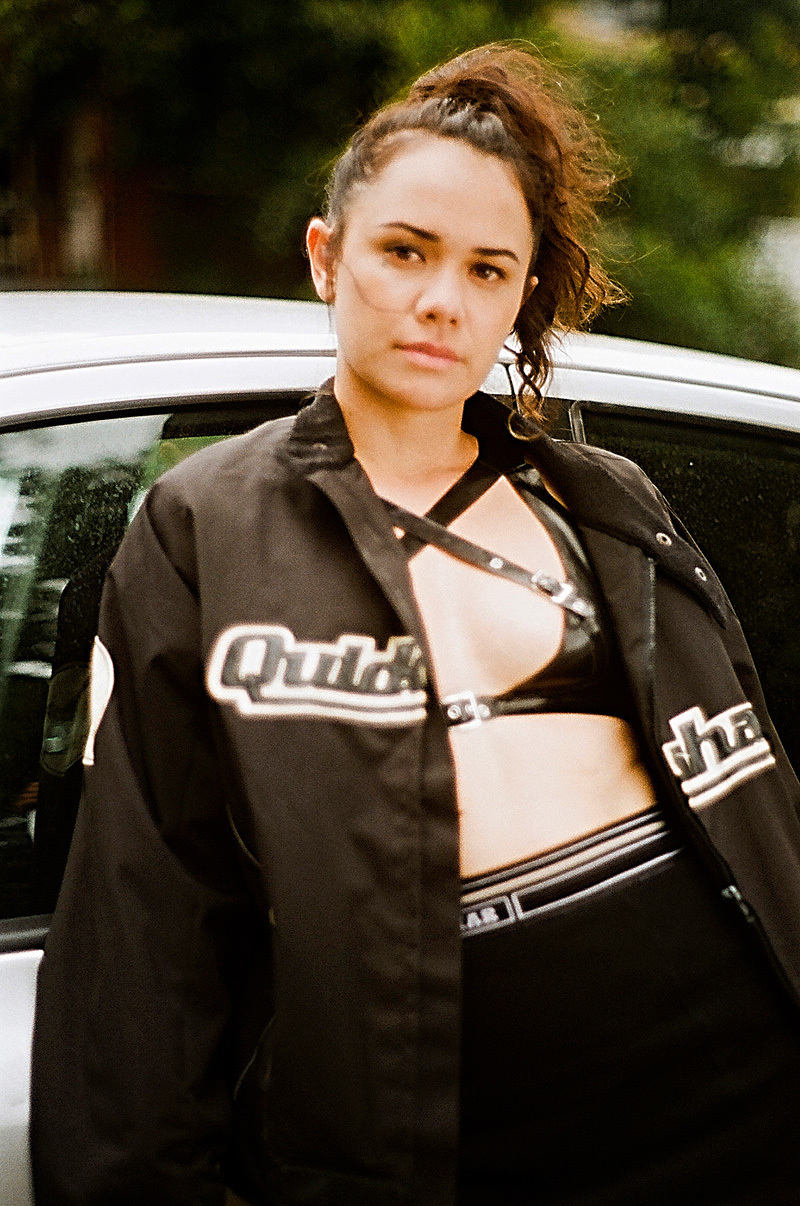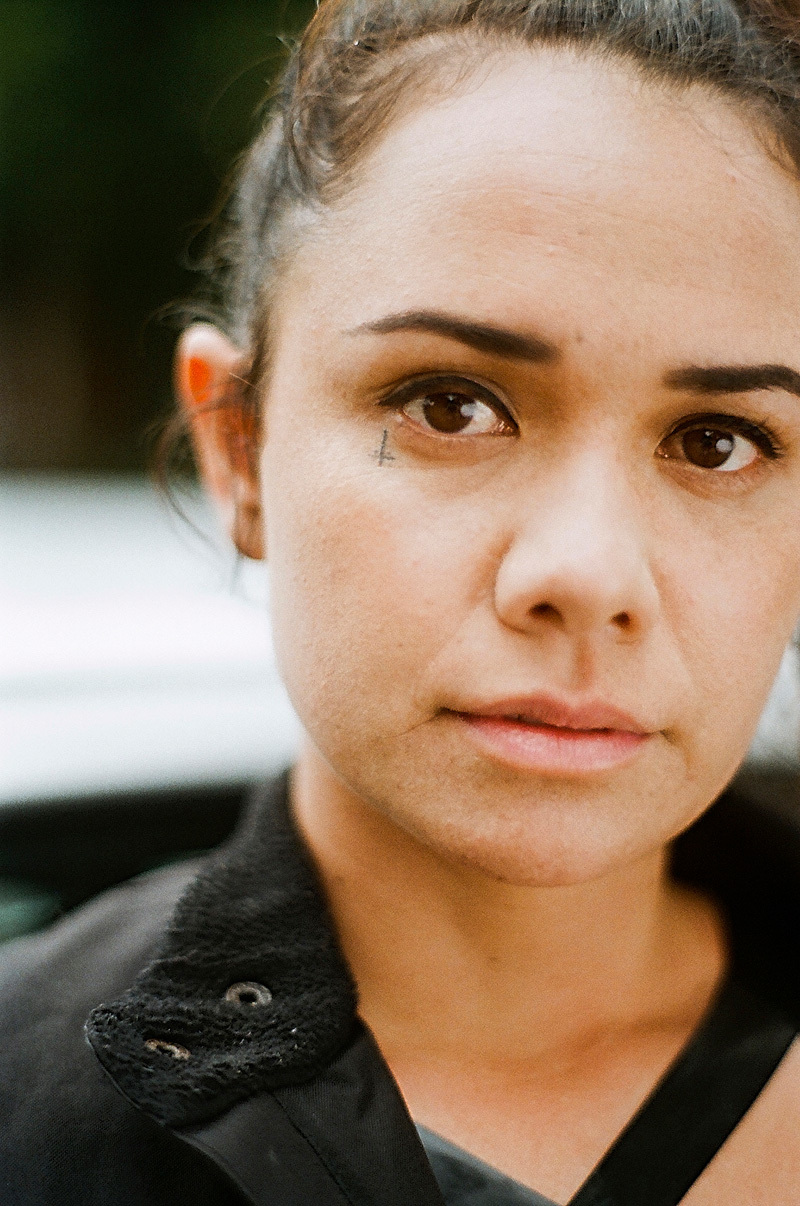In a time where violence against queer and Indigenous people feels frighteningly present, the warmth and complexity of community can serve as its own kind of resistance. In Brisbane, Sezzo Snot has made it her mission to build this mini coalition. Her mentality emphasises the power in forming families of like-minded people who value loving politics and community support over forming “scenes.” Starting out wanting to simply play music she’d dance to, over the past year she’s blended woman/LGBTQ oriented hip hop and dance music to create a more subversive and inclusive party space outside of the more normative gay sphere.
Playing all over the country, she’s attracted growing crowds and fans with her intuitive playlists and philosophies about dance, self-ownership and togetherness.
I-D sat down with her to talk about the insularity of scenes, how people feel connected to place, dance, humility and the gentrification/assimilation of Indigenous culture.
I’d like to begin by asking you about how you feel attached to community, location and scenes. How do you see our roots — where we grew up and our cultural background — seeping into our work?
It’s true that you never realise how much you owe to your heritage, and that’s a feeling a lot of Australians have — whether your parents came from overseas, if you’re Indigenous, if you’ve been affected by the stolen generations.
It’s only recently, like in the last few years, that I’ve started to realise how much I’ve actually assimilated. I feel like places and culture seep into you unconsciously and form a huge part of your psyche without you realising. With heritage, one thing that really solidified that for me was very recent: I was hosting this feminist event that Liquid Architecture put on in Sydney. Coco Solid who was speaking there is Maori and we were so similar that it freaked me out! I suppose I know what my family were like, but I just thought we were similar because we were related. I hadn’t interacted with many Maori people who were into similar things that I was. She was so down to earth, goofy, earnest, and anti-elitist. I came up to her after she spoke and said to her “you’re my sister!” and she was just like, “nah you’re just Maori as fuck!”

Does it evoke some kind of comfort for you to find these sort of cultural, almost familial ties with other people?
Well I’ve always felt like I go through life as a bit of a soloist. I always thought that my ideas and my perspective was really unique, which is true, no one’s experience is like anyone else, but I thought it all came from me. But my cultural background has probably affected those innate values.
Do notions of coolness, relevance, or what some people call social capital, discourage people from being vulnerable or open in this way?
I think everyone is talking about this secretly. This culture is about to be broken and people are going to react really strongly against that sensibility. What I’m talking about is this artistic/cultural/musical/slightly underground QTIPOC scenes that tend to be labelled as quite “radical.” Often these groups get into these protective, feisty little circles because of those reasons.
Do you think these these queer communities become very insular?
Yeah! I think to me, these are using the same process as our oppressors, which is basically a shaming process. I think it’s really noble that since feminism has existed, it’s been a reaction against masc values. It’s good to question those norms, but the intellectual move that I don’t vibe with in a lot of scenes is to assert a new set of norms that exclude and constrain.
Do you think there’s lack of an understanding of context and unique needs amongst different queer communities?
Yes, and Birrugan (from Dispossessed) is always saying it’s a movement toward purity. People react so strongly towards anything that doesn’t meet that requirement, because they feel like those imperfect people are “polluting” them. But all of us are problematic! We really need to accept that basic truth, and when you accept you will always do wrong and always will, we’re much more forgiving of others.

When you travel around the country do you feel there’s a separation between those who feel they can dance and who those who feel more self conscious?
I hate to reinforce stereotypes, but black people definitely dance more! I started as a New Orleans bounce DJ — it was really niche, but I was totally obsessed with it. My entry into that was very much people like Big Freedia, Sissy Nobby, those people. And that was my entry into twerking too. I just came across it and thought “oh my god, this is so goofy and exciting, shaking my butt up and down!” It just felt very energising and freeing. And to experience your body and butt in a different way, averting the male gaze and finding the female gaze. When you twerk you kinda do it for your girlfriends, I think. At least that’s how I experienced it. It’s just expanding how you relate to your body, but I got a negative response from white women in Australia who automatically took it as something hyper-sexual and threatening. Whereas, I grew up with my mom and aunties dancing at weddings like crazy, being sexy, where it was no big deal. The cultural context makes a big difference.
My friend was DJing and he was playing twerk bounce music and this woman came up and said, “I don’t like what you’re making these girls do.” So she firstly denied us our agency, and secondly didn’t like it because she was alluding to how she interpreted it as being sexual. And thirdly, perpetuated the underlying idea that being sexual is bad.
For many the club was cultivated as a place for people who were disenfranchised or people who didn’t have a “home”. Do you think there’s a shift back to those roots and back to prioritising marginalised people?
I don’t think there’s a conscious move towards recognising that or why those things are connected, but those LGBTQ threads can still be present. When techno first came out of Detroit it was overtly political, especially second-wave techno. The first thing that actually came to mind when you asked me about this though is the whiteification of culture. Where the original, more political meaning has been lost and it’s all about shallowly taking part in a cultural phenomenon. It’s just about hedonism even if the hedonistic part of it is still really important. It’s a fetishisation of culture — it becomes diluted down.
Credits
Text and photography Jonno Revanche
